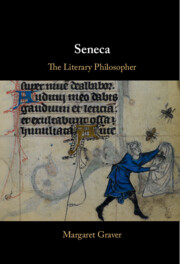Book contents
- Seneca
- Seneca
- Copyright page
- Contents
- Figures
- Preface
- Texts, Translations, and Abbreviations
- Introduction
- Part I Recreating the Stoic Past
- Part II Rival Traditions in Philosophy
- Part III Models of Emotional Experience
- Part IV The Self within the Text
- Chapter 9 The Challenge of the Phaedrus
- Chapter 10 The Mouse, the Moneybox, and the Six-Footed Scurrying Solecism
- Chapter 11 The Manhandling of Maecenas
- Chapter 12 Honeybee Reading and Self-Scripting
- Bibliography
- Passages Treated
- Index
Chapter 12 - Honeybee Reading and Self-Scripting
from Part IV - The Self within the Text
Published online by Cambridge University Press: 23 March 2023
- Seneca
- Seneca
- Copyright page
- Contents
- Figures
- Preface
- Texts, Translations, and Abbreviations
- Introduction
- Part I Recreating the Stoic Past
- Part II Rival Traditions in Philosophy
- Part III Models of Emotional Experience
- Part IV The Self within the Text
- Chapter 9 The Challenge of the Phaedrus
- Chapter 10 The Mouse, the Moneybox, and the Six-Footed Scurrying Solecism
- Chapter 11 The Manhandling of Maecenas
- Chapter 12 Honeybee Reading and Self-Scripting
- Bibliography
- Passages Treated
- Index
Summary
Chapter 12 gives close attention to the idea of self that is situated at the intersection of Seneca’s literary ambitions and his lifelong interest in Stoic moral psychology. The main text is Letters on Ethics 84, with its extended comparison of reading and writing to the activity of bees. Reflecting on this image, Foucault in “L’écriture de soi” captured the essential idea that writing is for Seneca an act of self-constitution. Here, a philologically informed reading recovers further ideas. Seneca has in mind not the subliterary activities that Foucault envisioned, but a consciously aesthetic practice of creation for the reading public. Study (studium) depends on reading but comes to fruition in the crafting of the ingenium, the literary talent that is to be recognized by future generations; at the same time, it is also the training of one’s character, fitting it for moral action. In the metaphoric progression of the letter, Seneca melds Roman canons of literary achievement with Stoic notion of moral progress into a conception of a scripted and exteriorized self more tightly integrated, through art, than the biological self and capable of surviving the death of the body.
Keywords
- Type
- Chapter
- Information
- SenecaThe Literary Philosopher, pp. 262 - 283Publisher: Cambridge University PressPrint publication year: 2023

